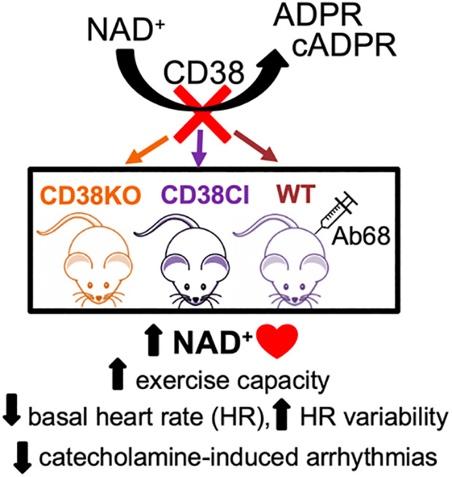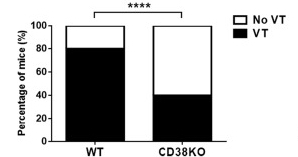Key Points:
- Suppressing CD38 raises NAD+ levels and enhances exercise performance in mice.
- CD38 suppression also improves heart rate and heart rate variability.
- Deletion of CD38 protects mice against heart rhythm abnormalities.
As long as we are alive, the heart never ceases to beat. With each pump, billions of metabolically active, energy-consuming cells orchestrate the heart’s synchronous contractions. The sheer energy required for each beat depends on adequate levels of a vital compound called NAD+. When NAD+ levels drop, the orchestration of the heart’s beats can go out-of-rhythm and become irregular, a phenomenon known as arrhythmia.
A new study published in the Journal of Molecular and Cellular Cardiology by Agorrody and colleagues from the University of the Republic in Uruguay and the Mayo Clinic in the United States shows that suppressing CD38 – an enzyme that breaks down NAD+ – protects the heart and improves exercise performance in mice. These findings suggest that drugs that raise NAD+ levels by blocking its degradation could play a crucial role in treating and preventing heart arrhythmias and other heart abnormalities.

(Agorrody et al., 2022 | Journal of Molecular and Cellular Cardiology) Suppressing CD38 Raises NAD+ Levels and Improves Exercise Performance and Heart Rhythms. Three different methods to silence CD38 — genetic deletion (CD38KO), functional inhibition (CD38CI), and pharmacological inhibition (Ab68) — raise NAD+ levels, enhance exercise capacity, and improve heart rhythms in mice.
Removing CD38 Enhances Exercise Performance
NAD+ (nicotinamide adenine dinucleotide) is an essential molecule in energy utilization that declines with age and contributes to many age-related diseases, including heart disease in animals. NAD+ is broken down and depleted by multiple enzymes, but CD38 is the primary NAD+ consuming enzyme associated with aging.
CD38 is an immune system protein typically activated in response to infection. However, abnormal activation of CD38 can lead to autoimmune and metabolic diseases. CD38 activity rises with aging, leading to the decline of NAD+ and increased susceptibility to stress and disease. While the role of CD38 in heart disease is not entirely understood, it has been associated with heart failure and ischemic heart disease.
When we exercise, our heart works harder to pump sufficient levels of oxygen and nutrients to our cells. Exercise is a well-known method for evaluating heart function. To study the effect of CD38 on exercise performance, Agorrody and colleagues used two methods of inhibiting the function of CD38: deleting the CD38 gene (CD38KO) or rendering the capacity of CD38 to break down NAD+ dysfunctional (CD38CI).
These two types of CD38-silenced mice were put onto mouse-sized uphill treadmills, running until exhausted. Compared to unaltered mice, both types of CD38-silenced mice showed enhanced exercise performance, traveling nearly double the distance while running faster and longer (time to exhaustion). The NAD+ levels were raised in the hearts of these mice and NAD+ breakdown essentially ceased. These results highlight that raising NAD+ levels by inhibiting CD38 can improve exercise and heart function.

(Agorrody et al., 2022 | Journal of Molecular and Cellular Cardiology) Suppressing CD38 Raises NAD+ and Improves Exercise Performance. (A) Genetically deleting (CD38KO) and functionally inhibiting (CD38CI) CD38 in mice increases several parameters of exercise (from left to right): distance run, maximum speed, time to exhaustion, and work of exercise.
Removing CD38 Lowers Heart Rate, Raises Heart Rate Variability, and Prevents Abnormal Heart Rhythms
What Agorrody and colleagues next addressed was how CD38 affects the function of the heart. To do so, they used an ECG (electrocardiogram) – a common method for electrical recordings of the heart – on both types of the CD38-silenced mice, observing a lowered heart rate and increased heart rate variability in both. A low heart rate can be considered a desirable feature for heart performance, and an increase in heart rate variability could be considered a sign of healthy modulation of the heart by the nervous system.
Ventricular arrhythmias occur when the heart beats irregularly. These irregular heartbeats can signify that the heart is not pumping correctly, potentially leading to heart failure. Agorrody and colleagues tested whether CD38 removal protected against ventricular arrhythmias by injecting CD38KO mice with caffeine and epinephrine (adrenaline) to put the heart into overdrive.
By reading ECG recordings before and after caffeine-epinephrine-induced nervous system overdrive, the Uruguayan scientists found that the CD38KO mice had less chance of arrhythmias. This protection may be mediated by better calcium handling – the movement of calcium ions in heart cells –which Agorrody and colleagues also observed in this study.

(Agorrody et al., 2022 | Journal of Molecular and Cellular Cardiology) Suppressing CD38 Prevents Abnormal Heart Rhythms. Genetically deleting CD38 (CD38KO) reduces the occurrence of abnormal heart rhythms (VT – ventricular tachycardia) in mice. Electrical signals (ECG) from the heart before and after caffeine-epinephrine-induced VT are shown in control (WT, wild-type) and CD38KO mice. The bar graph shows the percentage of mice with VT.
Inhibiting CD38 as Therapy for Heart Disease
The findings of this study demonstrate that CD38 is the main NAD+ breakdown enzyme of the heart and the main regulator of NAD+ homeostasis in mice. Genetically removing or eliminating the enzymatic activity of CD38 enhances exercise capacity and improves heart abnormalities. These findings were also observed in mice treated with a CD38 inhibitor called Ab68. This could mean that CD38 inhibition can be used as a potential treatment for heart disease in humans in the future.
There are several clinical trials currently underway testing FDA-approved CD38 inhibitors like Darzalex (developed by Jannsen) and Sarclisa (by Sanofi). Among other diseases, these drugs are being tested to treat white blood cell cancer (multiple myeloma) and other cancers. Considering that CD38 is expressed on immune cells and can traverse the entire body, it may be difficult to treat just one disease or organ system with a CD38 inhibitor. It may be appropriate to develop methods for targeting specific organs with CD38 inhibitors, but for now, the outlook seems promising.